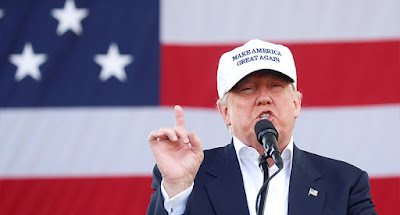 |
Republican presidential nominee Donald Trump holds a campaign event in Miami,
|
ON Sunday afternoon, President-elect Donald Trump tweeted the false assertion that “millions of people” voted illegally in the 2016 election, which was why he did not win the popular vote.
Politico spoke to election experts and historians who were flabbergasted at the claim, which appears to have originated in the right-wing fever swamp InfoWars.com and has no factual basis.
Hours after the first tweet, Trump launched another sensational claim without providing any evidence whatsoever.
“Serious voter fraud in Virginia, New Hampshire and California — so why isn’t the media reporting on this? Serious bias — big problem!” the former reality TV star wrote.
Election law expert Rick Hasen of the University of California, Irvine said that Trump’s claims are absurd on their face.
“There’s no reason to believe this is true,” Hasen told Politico. “The level of fraud in US elections is quite low.”
“The problem of non-citizen voting is quite small — like we’re talking claims in the dozens, we’re not talking voting in the millions, or the thousands, or even the hundreds,” he said.
David Becker — executive director of the Center for Election Innovation & Research and a former attorney in the Voting Section of the Department of Justice’s Civil Rights Division — said widespread vote fraud is highly unlikely.
“We know historically that this almost never happens,” Becker said. “You’re more likely to get eaten by a shark that simultaneously gets hit by lightning than to find a non-citizen voting.”
Trump aides spoke to Politico anonymously saying that the recount effort spearheaded by Green Party candidate Jill Stein has seriously gotten under the president-elect’s skin and he can’t let it go.
Another aide said that Trump believes that “the Democratic establishment will try to steal” his victory in the electoral college.
This round of reports of undocumented “illegal” voters seems to have its origin in a Nov. 14 post at InfoWars in which conspiracy monger Alex Jones featured Gregg Phillips — a former Newt Gingrich backer who says that widespread fraud took place in November’s balloting.
Phillips revealed no evidence for his claims, but said he will “release a comprehensive research study to the public, Attorney General [nominee Jeff] Sessions and all interested parties.”
“Radio host Alex Jones, who runs Infowars, has faced criticism for promoting unsubstantiated — and often bizarre — conspiracy theories, including that the 2012 Sandy Hook Elementary School shooting, which resulted in the death of 20 children, is a hoax, and that Hillary Clinton is a ‘demon from Hell,'” wrote Politico‘s Andrew Restuccia.
The looming specter of “vote fraud” has long formed the bedrock of the Republican push for voter ID laws, which don’t actually prevent vote fraud, but make it harder for traditionally Democratic constituencies like African-Americans, the poor and the elderly to vote.
Some experts believe that Republican efforts to suppress voting by minorities and others may actually have handed Trump his electoral college victory, if not the popular vote, which he lost by more than two million.
But as for Trump’s charges that vote fraud cost him the popular vote, York University history professor Timothy Naftali said the claims are unprecedented.
“Trump is the first winning candidate to question the legitimacy of the process that gave him the White House,” Naftali said.
Princeton historian Julian Zelizer said the only other claim of widespread vote fraud was in 1876, when both presidential candidates Samuel J. Tilden and Rutherford B. Hayes alleged that the election had been marred by fraud.
“But in that case, there was evidence of fraud and corruption in certain areas,” he explained.
“In this case, we see the victor making blanket accusation of fraud to delegitimize 2.5 million votes,” said Zelizer. “Given there is no evidence to support the claim, this is simply stunning and troubling as a sign as to what he will do as president.”
EmoticonEmoticon